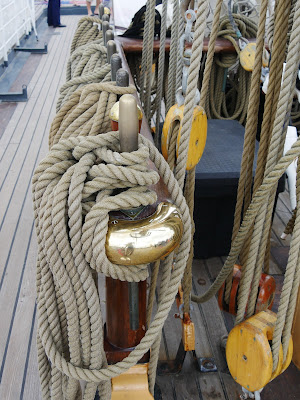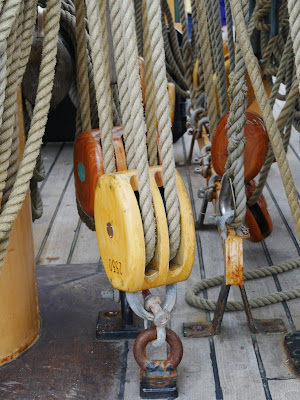The Eagle was open for public tours over the weekend of
August 3 & 4. We arrived shortly after it opened for tours on Sunday and
found a long line already formed. Event organizers had anticipated this. There
was a lady making swords from balloons to the delight all the children.
Historical reenactors chatted with the crowd. Live music was being played.
Walking along the wharf, one is initially struck by the sheer
length of this nearly 300 foot long ship. Then you look up at the tall masts
and momentarily try to image yourself climbing to the top of all that rigging.
If you have a fear of heights you will feel a bit squeamish.
The tour is limited to the deck of the ship but provides a
good feel for it and introduces one to the various major operations. Cadets
were stationed along the tour to answer questions about the Eagle and the Coast
Guard service. Two educational stations were setup. The first station explained
the principles of mechanical advantage provided by the block and tackle pulleys
used on board to raise the heavy sails. The second station focused on the many
layers of materials that cover the steel cables to protect them from the salt
water and prevent them from fraying sails and ropes. The most impressive thing
along the tour were the triple wheels
used to steer the Eagle. Normally it is manned by six crew people but in rough
weather as many as 16 hands are needed.
Even standing back some distance it was impossible to
get the whole ship in the picture.
It was a bit dizzying just looking up to the top of
the masts.
We found a couple of stowaways. They like to write about
their adventures for the blog http://adventures-of-chippy.blogspot.com/
Bow and ship’s bell
Okay which rope controls which sail?
A small sampling of the numerous pulleys used.
The little wooden chipmunk who goes by the name of Merry
practices his camouflage techniques blending in with the wood grain of the
pulley.
The triple wheel for steering the ship
Modern engineering marvel as seen through a centuries
old technology.
The next generation of Naval surface watercraft. Where are the sails?


















No comments:
Post a Comment